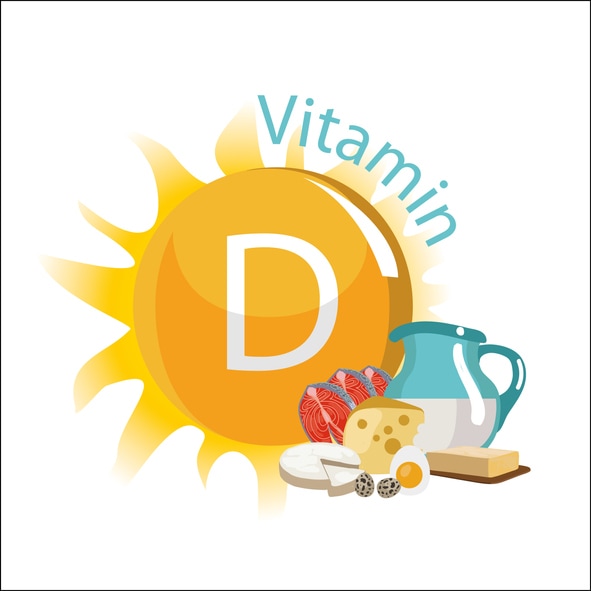Often referred to as the “sunshine vitamin”, vitamin D can be produced in the body when the skin is exposed to sunlight. Discover the several sources of vitamin D and the roles it plays in the body.
The roles of vitamin D
Hands down one of the most vital functions of vitamin D is to stimulate calcium absorption in the gut and maintain healthy levels of phosphorus in the blood. This ensures that bones and teeth remain strong and healthy.
Without adequate vitamin D, bones can become thin, brittle, and misshapen and may easily fracture. In children, this condition is known as rickets. In adults, it is diagnosed as osteomalacia (soft bones) or osteoporosis (fragile bones). Emerging research suggests that vitamin D may also play a role in the prevention of diabetes, high blood pressure, and multiple sclerosis.
Where vitamin D can be found
Not many foods naturally contain vitamin D. This is the reason food manufacturers add vitamin D to foods. This is referred to as food fortification and this practice helps ensure the average American consumes an adequate amount of vitamin D to promote health.
Abundant amounts of vitamin D can be found in the following food sources:
- Fatty or oily fish such as salmon, tuna, and mackerel
- Shrimp
- Egg yolk
- Beef Liver
- Cheese
- Cod Liver oil
- Cow's milk, vitamin D fortified
- Soy milk, vitamin D fortified
- Yogurt, vitamin D fortified
- Ready-to-eat cereal, vitamin D fortified
Vitamin D may also be consumed through supplementation
Vitamin D is available in two forms, D2 and D3, and both can be found in vitamin D supplements. At this time, health professionals believe the two forms of the vitamin are equivalent in their ability to supply the body with needed vitamin D
Vitamin D deficiency
A deficiency of vitamin D can develop over time if an inadequate amount is consumed. Several factors may increase an individual’s risk of developing a deficiency.
Those living in the northern regions of the United States may be particularly susceptible to vitamin D deficiency as exposure to sunlight is limited in the winter months. Additionally, individuals who spend most of their time indoors or sleep during daylight hours are also at risk for vitamin D deficiency.
Wearing sunscreen prevents exposure of the skin to sunlight and reduces the amount of vitamin D the body can produce. It is important to note that it is highly recommended that individuals consult with a health care provider to assess the risks associated with sunlight exposure.
Infants who exclusively breastfeed also require a vitamin D supplement as breastmilk is a poor source of this important vitamin. As well, individuals affected by Crohn’s disease or celiac disease may also be at risk for a vitamin D deficiency.
Mom's Meals® can help
To ensure adequate vitamin D intake, clients can rest assured that the meals provided by Mom’s Meals provide approximately one-third of the vitamin D intake recommended for one day. This makes it simple and convenient to enjoy delicious food that satisfies your hunger and taste, and helps you meet your need for vitamin D.
Sources:
https://ods.od.nih.gov/factsheets/VitaminD-health%20Professional/



